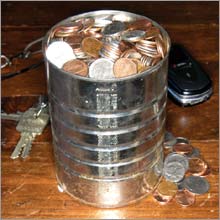|
Saving for a house ain't that hard
When you start with zero, coming up with a down payment seems impossible. But people do it all the time.
NEW YORK (MONEY Magazine) - Where the hell did you get the money?" That question has been popping into my head as more of my friends tell me that they're buying a house. Social graces and feelings of inadequacy stop me from saying it aloud, but come on, I think to myself. You work for a nonprofit and your husband's a teacher. You're telling me you scrounged up 50 large for a down payment by eating out less and clipping coupons?
Their parents probably helped (not that there's anything wrong with that) or they got an inheritance (that either), I think to myself. Or maybe they're part of the increasingly - and disturbingly - high number of first-time home buyers who put no money down (43 percent, according to the National Association of Realtors). But recently, another possibility struck me: What if they really did save it up themselves? What if they actually made some smart moves to rack up a down payment quickly? At first, this possibility caused me some dyspepsia - the closest thing my wife and I have to a down payment is whatever's in the coffee can on the dresser. But after that feeling passed, I had a wonderful revelation: My God, it's possible! Now that I - and, I hope, you - are seeing that coffee can as half full, where to begin? Get serious
If the actual purchase of said house is a few years off, you might have a hard time staying motivated about saving. Make the goal feel more real by attending the occasional open house starting now. You'll learn what your money gets you in different parts of town and, more important, you'll start to feel like a genuine home buyer. Be realistic too about how much money you'll have to come up with. Aim to put down 10 percent to 20 percent of what you think the purchase price might be - the bigger your down payment, the lower your mortgage payments will be - and tack on another 3 percent to 5 percent for closing costs. Sure, the number may be scary, but it's better to know and be prepared than to be caught short later. Finding the money
Yes, saving more will probably involve eating out less and clipping coupons. Also, perhaps, a less expensive car lease, homemade coffee in the morning and no more Starz channel. Look at what you spend each month, and imagine what you would do if you had, for instance, $150 less at your disposal next month. You'd adjust. Next, take advantage of the greatest invention since the Post-It note: an automatic investing plan. Open an online savings account (look for a rate of 4.5 percent and no minimum balance) and arrange to have that $150 deducted from your checking account at regular intervals - timed, for example, to coincide with when you get paid at work. After a month, you won't miss the money. Honest. Call the account your House Fund or something - my wife (our CFO) dubbed ours the Crib Kitty. Any time you win a bet or get a bonus, tax refund, or other surprise income, you'll know where to put it. Ask for a donation
There's no shame in getting help from parents with your down payment. They would probably love to help (if they can), and they'd also probably love to avoid estate taxes by gifting some money before they move up to that great 5BR, 3 bath in the sky. Just get it far in advance of applying for a mortgage. "A bank doesn't like to lend to someone who's 100 percent leveraged when they're buying a house," says financial planner Scott Kahan of Financial Asset Management in New York City. He suggests securing the gift at least three months before getting a mortgage because that's how far back most banks check you out. "That way, as far as they know, it's your money and always has been," he says. If you can't do that, the lender will probably require a "gift letter" affirming that the money was a gift, not a loan (even if you plan to pay your folks back). Borrow - if you must
If you're close to your target but aren't there yet, and you see a house you can't pass up, consider borrowing the remainder of the down payment from your 401(k). The rate is usually good compared with other loans (typically, the prime rate plus one point) and you generally have 15 years to pay back the money. Plus, the interest and principal you pay go back into your own account. The downside: If you leave your job, you have to pay back the remaining balance right away. Another option is to participate in a first-time home buyer program through the government or a private lender. These programs may enable you to buy a house while putting down as little as 2 percent to 3 percent. But in the end you'd simply be piling up more debt, with a bigger mortgage and possibly more house than you can afford. A better option would be to wait for another year while you save more. Stay focused
Read the classified ads religiously, and keep going to those open houses. It's amazing what staring out a kitchen window and picturing your child running through the backyard can do for your financial discipline. |
|

